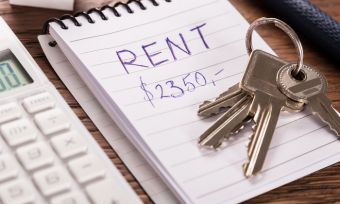The lease on a new rental home is usually for a year. And a lot can happen to affect your personal circumstances over that time. So, should you need to opt out of your tenancy agreement, is it permitted? Canstar explores if you are able to break a lease early.
Do you have a fixed-term lease or periodic agreement?
If you need to break your lease early, the first step is to check what type of tenancy you have:
- Fixed-term lease – you have signed on for a set period of time, usually a 12-month period. This lease has a set end date.
- Periodic agreement – has no end date. It simply continues until either the landlord or tenant gives notice to end the agreement.
A new lease is typically for a fixed term, with a set start and end date. In New Zealand, if you sign a fixed-term lease for 90 days or longer, it will automatically become a periodic lease upon expiry.
If your fixed-term lease has expired and you are on a periodic agreement, breaking your lease is relatively easy. All you have to do is:
- Give your landlord at least 21 days’ notice (in writing) informing them of your intention to leave
Just note that you are required to pay for the full 21 days’ notice period, even if you move out earlier.
Ending a fixed-term lease early
According to the Tenancy Services website, changes to fixed-term tenancies can only be made with the approval of the tenants and landlord. Changes should be documented and all parties need to keep a copy.
Your landlord can ask you to cover any costs they might incur by you breaking the lease. These can include:
- Advertising for new tenants
- Hosting viewings
- Administration (background checks, drawing up new tenancy agreements, etc)
- Lost rent
You landlord should provide you with a detailed invoice listing these costs. They can’t simply charge you for breaking the lease.
What if your landlord doesn’t agree to ending your lease early?
A landlord does not have to agree to end a lease early. If you are on a fixed-term lease, you are legally required to continue paying rent up until the agreed finish date. However, as long as you cover any costs related to breaking the lease early, most landlords should (in theory) agree to you moving out early.
But if your landlord refuses to release you from your lease early, what options do you have?
Assigning the lease
Assignment is the process of removing yourself from the tenancy agreement and adding someone new. So if you can find somebody to move in and take over your tenancy, you can assign the lease to them.
Your landlord has to consider your request, and can’t say no unreasonably. However:
- Any other tenants on your lease must agree to their new housemate
- Your landlord can set reasonable conditions for the new tenant
Subletting
While subletting is an option if you want to move out of your rental property early, it’s not ideal. Because if you sublet a property, as the main leaseholder, you remain responsible for paying the rent and for the condition of the property. So, should the subletting tenant miss rent payments, or cause damage to the property, you could be held responsible.
Subletting also requires a new tenancy agreement, between the tenant and the person subletting. This means that two tenancy agreements will be in place for the property. Your landlord must also give you permission to sublet.
Financial hardship
A fixed-term tenancy can be ended early by a tenant or a landlord on the grounds of financial hardship via the Tenancy Tribunal. In such cases, if an applicant is likely to suffer from severe hardship if the tenancy continues, the Tribunal may decide to end the lease early.
You can also apply to the Tribunal to cut your tenancy short if your rent has been hiked by a large amount.
Family violence
If you’re at risk of harm due to family violence in your rental property, you’re able to end a tenancy without financial penalty. In this situation, you can give two days’ notice, along with appropriate evidence of the family violence, to your landlord.
If there are co-tenants on the lease, they can pay proportionally reduced rent for two weeks while they find a new tenant.
Breaking a lease: what happens to your bond?
A landlord can’t refuse to return your bond because you’ve broken your lease early, but they can claim any outstanding rent or expenses they’ve incurred. However, both landlord and tenant have to agree on the costs and deductions. If you can’t come to an agreement, you can apply to the tenancy tribunal for help.
What happens if you just get up and leave?
If you walk out on your lease without notice, or without paying your landlord their associated costs, you could be taken to the tenancy tribunal, and/or blacklisted from future rentals. So it pays to do things by the book.
If you feel your landlord is being unreasonable
If you feel your landlord is penalising you for breaking your lease, unfairly refusing new prospective tenants, or you have any other tenancy related issues, you can contact the Tenancy Tribunal for help. The Tribunal provides advice and assistance on all tenancy related issues.
Compare Home & Contents Insurance
About the author of this page
In his role at Canstar, he has been a regular commentator in the NZ media, including on the Driven, Stuff and One Roof websites, the NZ Herald, Radio NZ, and Newstalk ZB.
Away from Canstar, Bruce creates puzzles for magazines and newspapers, including Woman’s Day and New Idea. He is also the co-author of the murder-mystery book 5 Minute Murder.










Share this article